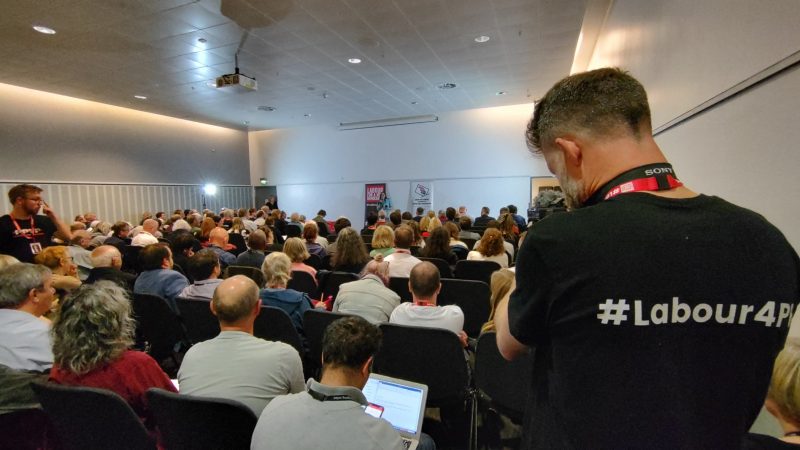
“The flaws in the current voting system are contributing to the distrust and alienation we see in politics.” That’s not just according to a motion passed by your local branch or the words of a backbench Labour MP or a call to action from a campaign group. That’s according to Labour’s official draft party programme.
For the first time, the Labour Party has acknowledged in formal policy documents that our democracy has a problem called ‘first past the post’. The fact that it has is testament to how far the party’s understanding about the real impact of the electoral system has come.
‘Unimaginable’ levels of support including unions
Since the last general election, support for proportional representation (PR) has gone from a relatively minority interest to the consensus position across the labour movement. A few years ago, it would have been unimaginable for hundreds of Constituency Labour Parties (CLPs) to send pro-PR motions to annual conference, for electoral reform to be prioritised for debate two years running or for CLP and trade union delegates to vote overwhelmingly in favour of a manifesto commitment to PR for general elections.
Not only has this happened, but since last year’s historic conference vote even more of Labour’s affiliated trade unions have passed policy in support of PR. In April, Usdaw became the latest to back electoral reform, following UNISON last year and Unite the year before – meaning unions representing two-thirds of affiliate members are committed to changing our voting system. They join the vast majority of the Labour membership. More than 60% of CLPs have already passed supportive local policy – with more than 96% of those CLPs which debate a motion voting in favour.
Electoral reform has demonstrably remained a major priority across the party during this year’s national policy forum (NPF) process – which will agree the ‘party programme’ that will shape the next manifesto. When the NPF’s six policy commissions ran consultations between January and March, 44% of all local branches and CLPs that submitted across all policy areas called for a commitment to PR for general elections.
In response to the ‘safe and secure communities’ consultation – which is responsible for constitutional reform but also crime, policing, justice, regional development and some transport policy – two-thirds of submissions from local parties backed PR.
Labour condemns FPTP but does not promise change
It is welcome, then, that the draft party programme – published after May’s local elections – is critical of first past the post, even if to say the system has “contributed to distrust and alienation” is an understatement. Millions of people across the UK are struggling to get by, yet know their vote makes no difference to how they’re represented or how the country is run. It’s no surprise that trust in politics and satisfaction with democracy are at an all time low – or that almost everyone feels “invisible” to politicians.
Keir Starmer is right when he says our voting system means “millions of people vote in safe seats and their voice doesn’t count”; right when he says “the Westminster system is part of the problem”; and right when he says “we need both a new government and a new way of governing”.
Yet whilst the document condemns first past the post, it does not promise change. Members of the NPF are entitled to table amendments to the draft policy – to be deliberated on and decided at the ‘final stage meeting’ of the NPF in late July.
To extremely tight timescales, CLPs mobilised to feed their thoughts on the documents into the policy process in May. Despite a less-than-three-week turnaround, some 100 CLPs spanning all eleven regions met, discussed the contents and formally asked their elected NPF reps to table the #Labour4PR amendment, which commits Labour to supporting PR for the House of Commons.
Voter reform backed across country
Over the same time period, Labour for a New Democracy organised meetings for each of the eleven Labour regions during which members could discuss this with their regional NPF reps. Opening presentations given at each meeting can have left reps in no doubt as to the sheer scale of support across the region and wider party. Hundreds of members spanning every part of the UK urged their elected reps to champion the views of the membership by tabling or supporting pro-PR amendments.
It was heartening to be a part of these meetings in our regions. For any NPF reps who did not manage to attend, L4ND are organising a final such meeting on July 5th – open to all reps and members wherever they are based.
As a result of the strength of demand for electoral reform, we know pro-PR amendments have been proposed and seconded by members’ representatives from all over the UK and across the spectrum of the party – and by CLP, socialist society and trade unions reps.
At the final stage meeting in July, the Labour Party can make clear that it recognises first past the post is driving alienation in our democracy – and that it lies at the heart of a political system which is letting Britain down. It can recognise the broad consensus which exists across the Labour movement that we must replace the voting system with something more proportional. Doing so will place Labour on the front foot to address the constitutional challenges and democratic renewal we must champion after more than a decade of Conservative mismanagement.




More from LabourList
Scottish Parliament elections 2026: Full list of Labour candidates for Holyrood
‘As metro mayors gain power, Labour must tighten political accountability’
Letters to the Editor – week ending 22 February 2026